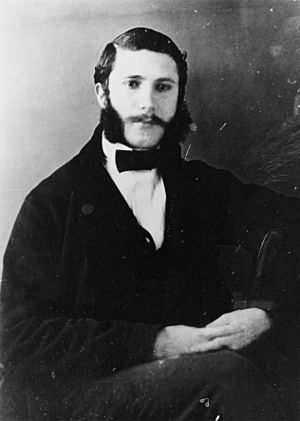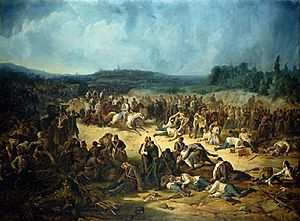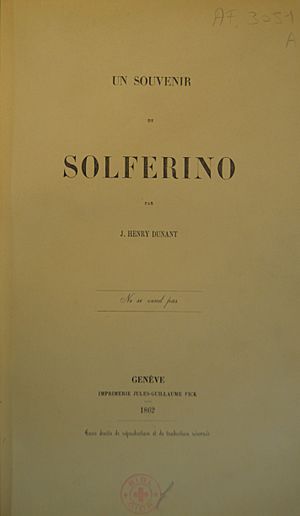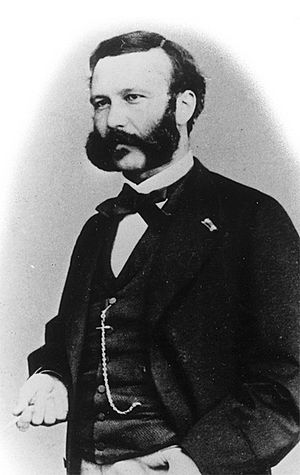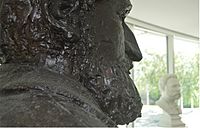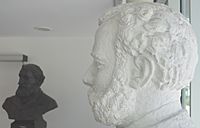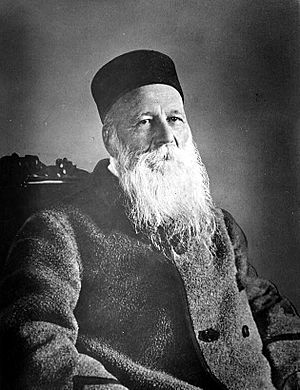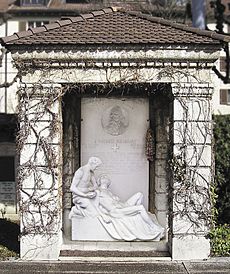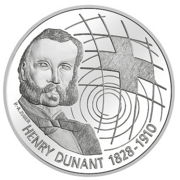Henry Dunant facts for kids
Quick facts for kids
Henry Dunant
|
|
|---|---|
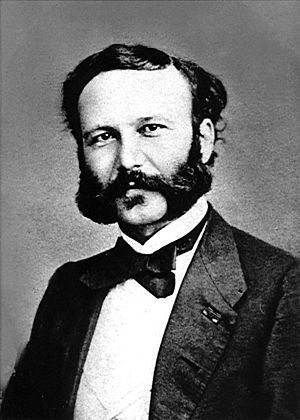
Dunant c. 1860s
|
|
| Born |
Jean-Henri Dunant
8 May 1828 Geneva, Switzerland
|
| Died | 30 October 1910 (aged 82) |
| Resting place | Friedhof Sihlfeld, Zürich-Wiedikon, Switzerland |
| Nationality | Swiss |
| Citizenship | Swiss French (from 1859) |
| Occupation | Social businessman, writer |
| Known for | Founder of the Red Cross |
| Awards | Nobel Peace Prize (1901) |
Henry Dunant (born Jean-Henri Dunant; May 8, 1828 – October 30, 1910) was a Swiss humanitarian, businessman, and social activist. He is famous for being the main person behind the creation of the Red Cross. In 1901, he received the first-ever Nobel Peace Prize along with Frédéric Passy. Dunant was the first person from Switzerland to win a Nobel Prize.
In 1859, Dunant saw the terrible aftermath of the Battle of Solferino in Italy. He wrote about his experiences in a book called A Memory of Solferino. This book inspired the creation of the International Committee of the Red Cross (ICRC) in 1863. The 1864 Geneva Convention was based on Dunant's idea for a neutral group to help wounded soldiers. Dunant also founded the Swiss branch of the YMCA.
Contents
Early Life and Education
Henry Dunant was born in Geneva, Switzerland, in 1828. He was the first son of Jean-Jacques Dunant, a businessman, and Antoinette Dunant-Colladon. His family was very religious and important in Geneva. His parents taught him the importance of helping others. His father helped orphans, while his mother cared for the sick and poor.
Dunant grew up during a time of religious revival. At 18, he joined a group that helped the poor. The next year, he started the "Thursday Association" with friends. This group studied the Bible and helped people in need. He spent much of his free time visiting prisons and doing social work. In 1852, he founded the Geneva branch of the YMCA. Three years later, he helped create its international organization in Paris.
In 1849, when he was 21, Dunant left school because of bad grades. He then started an apprenticeship at a money-changing company called Lullin et Sautter. After finishing his training, he continued to work there.
Business Ventures in Algeria
In 1853, Dunant traveled to Algeria, Tunisia, and Sicily for a company. Even though he didn't have much experience, he did well. This trip inspired him to write his first book, An Account of the Regency in Tunis, published in 1858.
In 1856, he started his own business to work in foreign lands. He got land in French-controlled Algeria and started a company to grow and trade corn. It was called the Financial and Industrial Company of Mons-Djémila Mills. However, there were problems with land and water rights. The local authorities were not very helpful. So, Dunant decided to ask the French emperor, Napoléon III, for help.
Napoleon III was with his army in Italy at the time. France was fighting alongside Piedmont-Sardinia against Austria. Napoleon's headquarters were in a small town called Solferino. Dunant wrote a book praising Napoleon III, hoping to give it to the emperor. He then traveled to Solferino to meet him in person.
Witnessing the Battle of Solferino
Dunant arrived in Solferino on the evening of June 24, 1859. A huge battle had just happened nearby. Forty thousand wounded, dying, and dead soldiers were left on the battlefield. There was almost no one to care for them. Dunant was shocked by what he saw. He decided to take action himself.
He organized the local people, especially women and girls, to help the injured soldiers. They didn't have enough supplies, so Dunant bought what was needed. He also helped set up temporary hospitals. He convinced the people to help all wounded soldiers, no matter which side they fought for. Their motto was "Tutti fratelli" (All are brothers). He even managed to get Austrian doctors, who had been captured by the French, released to help.
How the Red Cross Began
After returning to Geneva in July, Dunant wrote a book about his experiences. It was called Un Souvenir de Solferino (A Memory of Solferino). He published 1,600 copies in 1862 at his own cost. In the book, he described the battle and the terrible aftermath. He also suggested that a neutral organization should be created to care for wounded soldiers in future wars. He sent his book to many important leaders in Europe.
Dunant also traveled around Europe to share his ideas. His book was well-received. The president of the Geneva Society for Public Welfare, Gustave Moynier, discussed Dunant's ideas at a meeting on February 9, 1863. Dunant's suggestions were liked by the members. They formed a five-person committee to explore how to make his ideas happen. Dunant was one of the members. The others were Moynier, Swiss army general Henri Dufour, and doctors Louis Appia and Théodore Maunoir. Their first meeting on February 17, 1863, is now considered the founding date of the International Committee of the Red Cross.
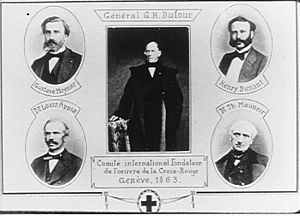
Moynier and Dunant often disagreed about their plans. Moynier thought Dunant's idea of protecting care providers as neutral was not practical. But Dunant kept promoting this idea to important political and military leaders. This made the disagreements between Moynier, who was more practical, and Dunant, who was more of an idealist, even stronger.
In October 1863, 14 countries met in Geneva. The committee organized this meeting to talk about improving care for wounded soldiers. Dunant helped lead the discussions. A year later, on August 22, 1864, the Swiss government held a diplomatic conference. This led to 12 countries signing the First Geneva Convention. Dunant was in charge of arranging places for the attendees to stay.
A Difficult Period
Dunant's businesses in Algeria faced problems. In April 1867, a financial company he was involved with went bankrupt. This caused a scandal. Dunant himself declared bankruptcy. People in Geneva, a city with strong Calvinist traditions, were upset. They asked him to leave the International Committee. He resigned as Secretary on August 25, 1867. On September 8, 1867, he was fully removed from the committee. In 1868, the Geneva Trade Court found him guilty of dishonest practices in the bankruptcies. His family and friends, who had invested in his company, also lost a lot of money.
In February 1868, Dunant's mother died. Later that year, he was removed from the YMCA. This was because he had founded the Geneva chapter, and they felt his business failure harmed the group. In March 1867, he left Geneva and never returned. Moynier may have used his influence to prevent Dunant from getting help from his friends. For example, a gold medal prize at the Paris World's Fair, originally planned for Dunant, was given to Moynier, Dufour, and Dunant together. This meant the prize money went to the committee as a whole. Napoleon III offered to pay half of Dunant's debts if his friends paid the other half, but Moynier's actions stopped this.
Dunant moved to Paris and lived in poor conditions. But he continued to work on his humanitarian ideas. During the Franco-Prussian War (1870–1871), he founded the Common Relief Society. He also started the Common Alliance for Order and Civilisation. He argued for countries to reduce their weapons and for an international court to settle conflicts. Later, he worked on the idea of a world library, which was similar to future projects like UNESCO.
As he kept promoting his ideas, he neglected his own money and fell deeper into debt. Many people he knew avoided him. Even though he was made an honorary member of Red Cross societies in several countries, he was largely forgotten by the Red Cross Movement. He lived in poverty, moving often between 1874 and 1886. In 1881, he visited the small Swiss village of Heiden for the first time. In 1887, while living in London, he started receiving some money from distant family members. This helped him live more securely, and he moved to Heiden in July. He lived there for the rest of his life, staying in a hospital and nursing home from 1892.
In Heiden, he met a young teacher named Wilhelm Sonderegger and his wife Susanna. They encouraged him to write down his life story. Susanna Sonderegger started a Red Cross branch in Heiden, and Dunant became its honorary president in 1890. Dunant hoped to promote his ideas with Sonderegger's help. However, their friendship became difficult because Dunant wrongly accused Sonderegger of working against him with Moynier. Sonderegger died in 1904 at age 42, which deeply saddened Dunant. Despite their strained relationship, the Sondereggers' admiration for Dunant continued. In 1935, their son René published a collection of letters from Dunant to his father.
Returning to Public Attention
In September 1895, Georg Baumberger, a newspaper editor, wrote an article about Henry Dunant. He had met Dunant during a walk in Heiden. The article, titled "Henri Dunant, the founder of the Red Cross," was published in a German magazine. It was soon reprinted across Europe. The article brought Dunant new attention and support. He received the Swiss Binet-Fendt Prize and a note from Pope Leo XIII. With support from the Russian empress Maria Feodorovna and other donations, his financial situation greatly improved.
In 1897, Rudolf Müller, who was now a teacher, wrote a book about the Red Cross's beginnings. This book highlighted Dunant's important role and included the text of A Memory of Solferino. Dunant began writing letters with Bertha von Suttner and wrote many articles. He was especially active in writing about women's rights. In 1897, he helped start a "Green Cross" women's organization, though it was only active briefly in Brussels.
Winning the Nobel Peace Prize
In 1901, Dunant was awarded the first-ever Nobel Peace Prize. This was for his role in founding the International Red Cross Movement and starting the Geneva Convention. Rudolf Müller, and later a Norwegian doctor named Hans Daae, pushed for Dunant to receive the prize for four years. The award was shared with French pacifist Frédéric Passy, who founded the Peace League.
Moynier and the International Committee had also been nominated. Even though many people supported Dunant, he was still a controversial choice. Some argued that the Red Cross and the Geneva Convention made war seem less terrible, which might encourage it. Müller suggested that the prize be split between Dunant and Passy. He also said that Dunant should receive the prize quickly because of his old age and poor health.
By dividing the prize between Passy, a pacifist, and Dunant, a humanitarian, the Nobel Committee set a new standard. This decision had big effects on future Nobel Peace Prize selections. Part of Nobel's will said the prize should go to someone who worked to reduce armies or promote peace conferences. This made Passy a clear choice. However, giving the prize for humanitarian work alone was seen by some as a broad interpretation of Nobel's will. But another part of Nobel's will mentioned enhancing the "brotherhood of people." This could include humanitarian work like Dunant's. Many future Nobel Peace Prize winners fit into these two categories.
Hans Daae helped put Dunant's prize money, 104,000 Swiss Francs, into a Norwegian bank. This stopped his creditors from taking it. Dunant never spent any of the money during his lifetime. He continued to live simply and saved it to give to those who cared for him and to charities in his will.
Death and Lasting Impact
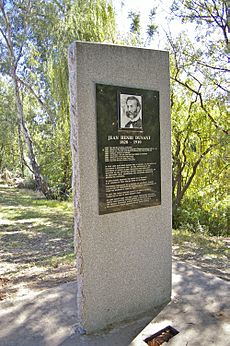
Dunant received several other awards in the years that followed. In 1903, the medical school at the University of Heidelberg gave him an honorary doctorate. He lived in the nursing home in Heiden until he died. In his final years, he suffered from sadness and a fear that his creditors and Moynier were still after him. Sometimes, he even made the nursing home cook taste his food first to make sure it wasn't poisoned. In his last years, he spoke against Calvinism and organized religion. He was said to be agnostic, meaning he wasn't sure if God existed.
His nurses said his last act was to send a copy of Müller's book to the Italian queen with a personal message. He died on October 30, 1910. His last words were "Where has humanity gone?"
As he wished, he was buried without a ceremony in the Sihlfeld Cemetery in Zurich. In his will, he left money to make sure a "free bed" was always available for a poor person in the Heiden nursing home. He also gave money to friends and charities in Norway and Switzerland. The rest of his money went to his creditors, helping to pay off some of his debts. Not being able to fully pay off his debts was a big worry for him until he died.
His birthday, May 8, is celebrated as World Red Cross and Red Crescent Day. The former nursing home in Heiden is now the Henry Dunant Museum. Many streets, squares, and schools in Geneva and other places are named after him. The Henry Dunant Medal, given every two years, is the highest award of the International Red Cross and Red Crescent Movement.
His life story is told in films, with some fictional parts. These include D'homme à hommes (1948) and Henry Dunant: Red on the Cross (2006). In 2010, a musical called Dawn at Solferino, or Where has Humanity Gone? was staged, based on his time in Solferino and the Red Cross's founding.
- In honor of Henry Dunant, the second highest peak in Switzerland was renamed from Ostspitze to Dunantspitze (Peak Dunant) on October 6, 2014.
- Henry Dunant Hospital is a general hospital in Athens, Greece.
- The road where the headquarters of the Thai Red Cross Society is located is named Henri Dunant Road.
- In 2020, a submarine internet cable named Dunant was laid between Virginia Beach, USA, and Saint-Hilaire-de-Riez, France.
See Also
 In Spanish: Henry Dunant para niños
In Spanish: Henry Dunant para niños
- Henry Dunant Medal
- List of peace activists
- Dunantist
- International Red Cross and Red Crescent Movement
Fictional Stories About Dunant
- Henry Dunant: Red on the Cross (French: Henry Dunant: Rouge sur la Croix), 2006. This was a film made by France, Switzerland, and Austria. It starred Thomas Jouannet.
- Man to Men (French: D'homme à hommes), a 1948 French-Swiss historical drama film. It was directed by Christian-Jaque and starred Jean-Louis Barrault.
 | Kyle Baker |
 | Joseph Yoakum |
 | Laura Wheeler Waring |
 | Henry Ossawa Tanner |


